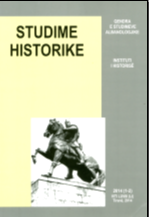“KOMBI SHQIPTAR”: NJË VËSHTRIM NGA MESJETA
“Albanian Nation”: a view from Middle Age
Author(s): Pëllumb XhufiSubject(s): History
Published by: Qendra e Studimeve Albanologjike
Keywords: Albanian Nation ; view from Middle Age
Summary/Abstract: In the foreigner's eyes the Albanians represented in the middle ages a nation different from the Greek and Slav neighbors. Several sources specify the descendance of Albanians from the Illyrians. Certainly, the consciousness of being Albanian existed in the Albanians of middle ages. They expressed their ethnicity in Albania or outside their country by their customs, clothings, social behaviors and language. Different foreign authors stressed that Albanians speaked a language different from that of the other countries. The Albanians considered their language as an element of identity. Even Frank Bardhi in 1635 shows to the Albanian language a warines of a renaissancer when expresses his wish to “help our language which is disrupted day by day”. On the other side we must say that the albanian conscience in the middle age grew upon the confrontatins with the neighbor countries. In the albanian sources of XVI-XVIII centuries is shown that the albanians had language, origins, observances, way of life and history different from that of Serbs or Greeks. The last, the community’s historical counsicousness can be seen clearly to Scanderbeg and his contemporaries. All these considered the Albanians as Pyrros of Epirus and the Alexander the Great's descendant's. Scanderbeg become for the albanians an identificial figure. From the XVI’th century toward our days Scanderbeg become the albanians of all the times, regions and religions a basic element of their national existence and counsciousness.
Journal: Studime Historike
- Issue Year: 2013
- Issue No: 03-04
- Page Range: 007-022
- Page Count: 16
- Language: Albanian

